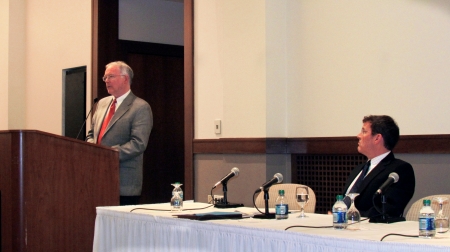
By
An effort to “articulate the vision” of Boston College’s renewed undergraduate core curriculum is the mission of a new University task force, the group’s chairman told faculty and administrators at a town meeting-style event last week.
College of Arts and Sciences Senior Associate Dean Gregory Kalscheur, SJ, said the Core Foundations Task Force, recently appointed by University President William P. Leahy, SJ, will build on the work of the past two years by the Core Renewal Committee, while also drawing from the last core revision in 1991.
In the coming months, the task force will solicit faculty comment on the proposal presented last spring by the Core Renewal Committee, and how it might serve as a basis for developing pilot courses by 2015.
“We want to get a sense as to how well the vision of this new core is being articulated, so that the process of renewing the core can move forward,” said Fr. Kalscheur.
The meeting, held Feb. 18 in the Corcoran Commons Heights Room, offered an occasion to review the state of the core renewal initiative, which began in the fall of 2012. Fr. Kalscheur, along with Interim Provost and Dean of Faculties Joseph Quinn, gave an overview of the Core Renewal Committee’s work – which included a collaboration with Continuum, an acclaimed innovative thinking and design consultancy – and the proposed 42-course core it developed.
Fr. Kalscheur and Quinn also put the core renewal initiative in the context of BC’s commitment to providing an intellectually challenging, contemporary-minded education rooted in Jesuit, Catholic tradition.
“The theme of the core renewal effort is ‘Who do we want to be as a university, and how can the core contribute to that?’” said Quinn. “We have to consider the special qualities of a Jesuit, Catholic education: ‘Educating men and women for others’ is a phrase that’s taken very seriously here. When you look at the PULSE program, the 350 volunteers at the Campus School, the 700 students who go to Appalachia every year, it’s plain that service is in our DNA.”
Fr. Kalscheur spoke about the special characteristics of Jesuit education and its place in the core. “When we look at the core curriculum, we’re not starting with a blank slate. We have the integrative vision of Jesuit education, which pulls together a range of aspects of what it means to be a whole person. BC’s heritage reflects that concern for intellectual, moral and spiritual formation.”
The remainder of the meeting was a question-and-answer session with the audience, which included representatives from the Core Foundations Task Force. Some of the discussion concerned the timeline for the core renewal initiative or aspects of the core renewal proposal; other questions centered on governance of the core, or the role of specific fields such as the arts, mathematics or science.
Quinn pointed to the proposal for two six-credit freshmen interdisciplinary courses as an incentive for faculty creativity. “BC will rely on the imagination of our faculty to put together interesting combinations of disciplines, and to come up with intriguing questions to animate the core.”
Fr. Kalscheur said the phrase “integration and order,” which he drew from a document prepared by the University’s Jesuit Community some years ago, is an apt description of the Jesuit approach to education, and can serve as a guiding principle for the creation and direction of core classes, especially interdisciplinary ones. “Having a sense of how disciplines speak to one another and move with one another is critical to the vision for the new core.”
Institute for the Liberal Arts Director Mary Crane, a member of both the Core Renewal Committee and Core Foundations Task Force, said that experimentation, as well as creativity, will be a facet of the new core, especially in the pilot phase.
“A lot of things will be tried out,” she said. “There will be a gradual process of testing ideas.”
One segment of the Q&A dealt with whether the six-credit courses were more appropriate for upperclassmen than freshmen. Quinn said there was considerable sentiment at BC for the need to challenge students at the very beginning of their time at BC, and thus set the tone early on for intellectual exploration.
“We want students to look at an issue or area of study they don’t know much about, to pique their curiosity, in the hope this will guide them to disciplines that will help answer their questions.”
In a discussion about the extent to which the core proposal – in its current or future forms – would reflect faculty interests, ideas and concerns, Crane said the Core Renewal Committee had included academic departments’ comments about the proposal in its report to Fr. Leahy last summer. Fr. Leahy talked about the comments at length with the committee, she said, and cited some in particular – notably questions on Jesuit-Catholic character – as the basis for forming the Core Foundations Task Force.
Quinn added, “The level of interest and enthusiasm the faculty have brought to the core renewal process is to be applauded. We’ve got to continue seeing more of that as we move forward; we need lots of faculty willing to try things to make the new core successful.”



